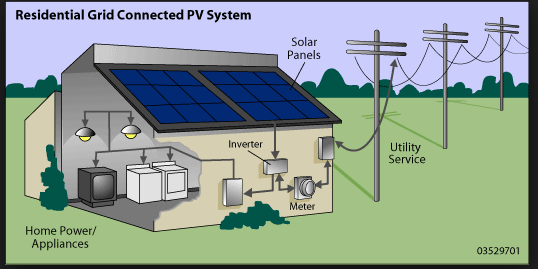The photovoltaic effect is what occurs when a material is able to generate electricity through contact with sunlight. Basically, it is the essential element needed to make solar panels work. The quality of panels and complexity of connections is what determines the maximum efficiency of a solar PV system. Solar PV can offer great benefits so long as you work smart and remember that, along with the environmental impact, the goal is to reduce your energy bills.
While utilizing every square foot of space on your roof may seem like the most efficient option, you are more likely to see more financial benefits from choosing an installation that meets your property needs. Making a success of solar PV involves carefully assessing your energy usage and then choosing the type of installation and incentives that will provide the highest return on your investment.
Savings on Energy Bills
By installing a net meter you have the potential to offset the consumption element of your energy bill. A net meter works by tracking the exchange of energy between your solar PV System and the grid. If your solar PV system produces less than the required energy your home gets the deficit energy through the grid and the meter will run forward. When the solar energy system produces more than required energy the surplus goes to the grid and the meter runs backwards giving the homeowner credits for the units supplied.
How surplus energy is used will depend on the retailer that you choose. It is therefore important to shop around and compare incentives. You may find retailers who are prepared to pay for the additional energy that is being generated from your solar PV installation.
Solar Option Key Considerations
In order to maximize your savings there are a few considerations you should be aware of diving into solar PV. While you may see a significant reduction in your energy spending, it is unlikely that most New South Wales homeowners will generate enough electricity to go completely off grid.
There are a number of common factors that will impact on the efficiency of your system. Quality is important, as is the scale and location of the system. You also have to consider how much electricity your home consumes and when you are likely to use it the most.
The weather is another major influence on how much you are likely to save but not necessarily for the reasons you may think. More sunlight can actually reduce the efficiency of your system as solar PV panels are designed to operate at different optimum levels. Most installations are designed to operate at around 25°C panel temperature. You can spend extra for panels with higher efficiency; however, it may not be worth it for the return.
Finally, the incentive paid by your retailer should play a part in your system installation. Again, it is essential that you go into any negotiations knowing how much energy you actually use. Some retailers may suggest you change the way in which you use electricity and in an ideal world the numbers may well add up; however, you need to think about whether making those changes is realistic for you and your family.
You can review a more detailed explanation of feed-in tariff rates and offers, as well as information installation and associated costs via the NSW Planning and Energy website. If you would like a building inspection in preparation of installing a solar PV system, contact Houspect today on 1300 258 789.






